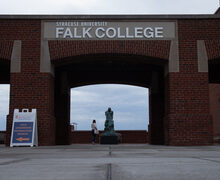Free speech policies should be reformed
The workgroup organized to address the free speech policies at Syracuse University needs to look further than just the Computer and Electronic Policy, and should make suggestions on how to overhaul free speech regulations in all aspects of academic life at SU.
In the fall 2014 semester Student Association and Graduate Student Organization passed resolutions to have the Computer and Electronic policy reviewed citing that as it stands it, “is vague, overly broad and subjective.”
It’s good that Chancellor Kent Syverud is addressing the concerns students have advocated for, and considering SU’s spotty history in dealings with free speech, it’s important that this workgroup has a wide scope when deciding the future of free speech policies at SU.
SU has a “red” speech code rating from the Foundation for Individual Rights in Education because it has two policies, “that both clearly and substantially restricts freedom of speech.” One of these is the Computer and Electronic policy, which is criticized for restricting First Amendment freedom on its definition of harassment. Currently, “harassing others by sending annoying, abusive, profane, threatening, defamatory or offensive messages is prohibited,” by the university.
It’s appropriate for the university to want to protect its students from emotional harm. Just as obscenity, true threats and fighting words are not protected under the First Amendment, they should not be protected by SU. But future policy must be more discerning and specific on what speech is prohibited. And it must be tailored so that it cannot be interpreted in other ways.
SU has been criticized for its history of limiting free speech: in 2007 a graduate student in the School of Education was expelled, and later reinstated, after posting racially-charged statements on Facebook; in 2010 a law student was charged with harassment and issued a gag order for his involvement in a satirical website; and in 2013 students took to spray painting, “#1 in communications, last in free speech” on Newhouse III — which has the First Amendment inscribed on it.
The workgroup shouldn’t limit itself to only focus on the university’s Computer and Electronic policy. Rather, the group needs to suggest changes on how to combat all policies that infringe upon students’ First Amendment rights.
Published on March 30, 2015 at 11:22 pm




